Adapting to the Society We Live in

When I first started working as a teacher in Liestal, Switzerland, I remember holding onto the pre-conceived idea that Swiss people aren’t really known for their friendliness. Why on earth did the other teachers in the staff room never greet me when I entered or say good-bye when I left, regardless of the size of my smile? Meanwhile, everyone else seemed to be getting her fair share of social respect.
I decided to get to the bottom of this problem, and over a set period of days, I believe – or maybe even weeks? – I observed their clothing, the way they entered the room, whether they went up to someone or just stood in the doorway, and whether they said the more formal Grüezi (“Good day”) or simply Tschau (“Hi” or “Bye”). But it was no use; I just couldn’t get to the bottom of it.
Until one day the penny dropped. It was that one little word, zämme, which was slung at the end of a greeting. It means “together,” and so hello becomes Tschau zämme (“Hi, all”) or Grüezi mitenand! (“Good afternoon, everyone”) and it makes ALL the difference – who’d have thought? So, I decided to give it a go. I stood by the door, hand on the door handle and took a deep breath, waited until I thought most of the other teachers were taking a sip of coffee or a breath of air and I said it:
“Tschau zämme!”
It worked! Nothing much happened – OTHER THAN EVERYONE SAYING, “Tschau, Karin.” And that was all; they all went on with their teacher things and I left the staff room, my heart beating, feeling like I’d moved the mountain. I felt like I was one of them, an equal member, no longer just the part-time English teacher whom nobody really noticed. I’d cracked the code.
Looking back now, of course I wonder how it could have escaped me for so long: part of it was surely to do with a natural prejudice after so many mistrials. It becomes increasingly frustrating when you can tell you are being treated differently, and even though you speak the language and are part of the team, you have a sense that you’re not ever going to be one of “them,” not really.
So it really felt like a milestone for me at the time, and from then on, there were slight changes in their approach to me. Because of such a minor detail! I imagined what other things I was saying and doing that had left me hanging in the shadows, and over the years I’ve become increasingly sensitised, especially now that I must worry that I may have taught my kids certain types of behaviour or words, even, that can make cultural communication (as I call it) difficult.
I am thinking of things that the kids always thought were normal, but as they got older they realised were not: e.g., not every mum brings her kids to school in her pyjamas or says the more formal Grüezi to her kids’ friends (normally reserved for adults) with a wave rather than with a handshake. Neither does every mum talk openly about head lice or the fact that she’d like a nurse to check the class after she’d had to combat head lice on monthly intervals over the period of pretty much an entire school year.
Not that the kids wouldn’t correct me… Oh, they do put me straight. It’s just that now, rather than wanting to feel a part of where I live because of how I behave, I’m quite happy knowing what the social etiquette is but keeping the option to just pretend that I don’t, whether for the sake of personal sanity or simply for fun. Because sometimes life should jolly well be a game of jumping between the shadows and the light, or whatever strikes your fancy.
By Karin Mohler
Karin is a former expat, having settled down in her native Switzerland after a childhood abroad. She is challenged daily with balancing the peculiarities she picked up on her travels and integrating them in daily life in what is supposed to be her homeland. Her three children aged 16, 14 and 10 help her bridge the gap in understanding the culture she is now living in. Failing that, she gains insight and inspiration from the book Third Culture Kids: Growing Up Among Worlds, by D. C. Pollock and R. v. Reken (2009).
Karin writes about her novel-writing process in her blog and shares her inspiration in everyday things on her Instagram account.
Illustration by Lara Friedrich
Lara has been a freelance illustrator for Mothering Matters since early 2013. She is in her third year of University (majoring in Psychology) where she’s currently working as an assistant in a research project in pedagogy. Lara is also an assistant translator from German to English for various fiction books, and also works as a demo singer for the songwriter Kate Northrop.




